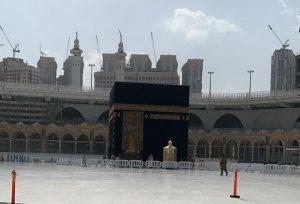These days, the question being repeatedly asked is, is it appropriate from an Islamic point of view to lock up mosques and stop congregation prayers in light of the quarantine regulations in force? To answer this question, we need to study the hadees or Prophetic traditions relevant to this subject.
 Sahih Bukhari, believed to be the most authentic source of hadees by Sunni Muslims, cites a tradition where Ibn-Umar (r.a.) said, “When it was a cold, rainy night, the Messenger of Allah (s.a.w.s.) used to command the Mua’zzin to say “Ala sallu-fir-rahaal” meaning “Pray in your dwellings””. The same hadees is cited in Sahih Muslim, the second most authentic source of Prophetic traditions.
Sahih Bukhari, believed to be the most authentic source of hadees by Sunni Muslims, cites a tradition where Ibn-Umar (r.a.) said, “When it was a cold, rainy night, the Messenger of Allah (s.a.w.s.) used to command the Mua’zzin to say “Ala sallu-fir-rahaal” meaning “Pray in your dwellings””. The same hadees is cited in Sahih Muslim, the second most authentic source of Prophetic traditions.
Both Sahih Bukhari and Sahih Muslim report a hadees on the authority of Abdullah bin-Haris (r.a.) where he narrated that once on a rainy muddy day, Ibn-Abbas (r.a.) delivered a sermon in our presence and when the Mua’zzin pronounced the Azaan (call to prayer) and said, “Haiya ala-s-salah” (come for the prayer)”, Ibn-Abbas (r.a.) ordered him to say “Pray at your homes”. When people expressed surprise Ibn-Abbas (r.a.) said, “It was done by one who was much better than I” i.e. the Prophet (s.a.w.s.), “and it is permitted”.
Sunan ibn-Majah, another widely read collection of hadees reports the same tradition and then adds that Ibn-Abbas (r.a.) then said, “Are you telling me that I should bring the people out of their houses and make them come to me wading through the mud up to their knees?”
Even in Kuwait today, in the Azaan being called from the mosques, the words “Haiya ala-s-salah” (come for the prayer)” are being replaced with “As-salatu fi buyutikum” or “Pray at your homes”.
It is therefore clear that if it can be ordered that people should pray in their homes in times of severe cold, or rain or slush, surely these same traditions would apply with still greater force in times of an epidemic involving a contagious disease.
There is a tradition passed down by Hazrat Abu Huraira (r.a.), one of the most reliable sources of Prophetic traditions, where he states that Allah’s Messenger (s.a.w.s.) said: “Do not put a patient with a healthy person” (as a precaution). This hadees is quoted by Sahih Bukhari, Sahih Muslim and numerous books of Tibb-e-Nabawi or Islamic Medicine.
There are Prophetic traditions reported by several Sahaba or Companions of the Prophet (s.a.w.s.) including Saud (r.a.), Amir bin-Waqqas (r.a.), and Usama bin-Zaid (r.a.) mentioned in Sahih Bukhari and Sahih Muslim in the context of plague, where the Prophet (s.a.w.s.) is reported to have said that, “If you hear of an outbreak of plague in a land, do not enter it; but if the plague breaks out in a place while you are in it, do not leave that place”.
From these ahadees, it is amply clear that social distancing and restrictions on travel during times of an epidemic are necessary even from an Islamic point of view. So, it is of utmost necessity that Muslims should remain at home and offer namaaz at home, even on Fridays, and beg for forgiveness from Allah and mercy from his wrath, for epidemics are signs of His Wrath.
May Allah forgive us and show us a right path.
– Mohammad Nizamuddin Pasha
(हिंदी अनुवाद के लिए यहाँ क्लिक करें)
Assalamualaikum,
Alhamdulillah, very well written and with the correct references of the Hadiths.
Do keep writing more.
Message